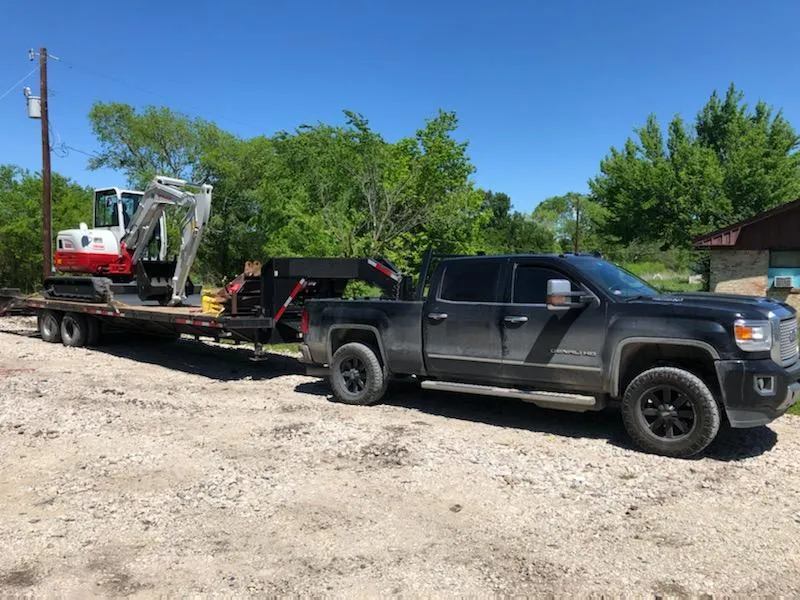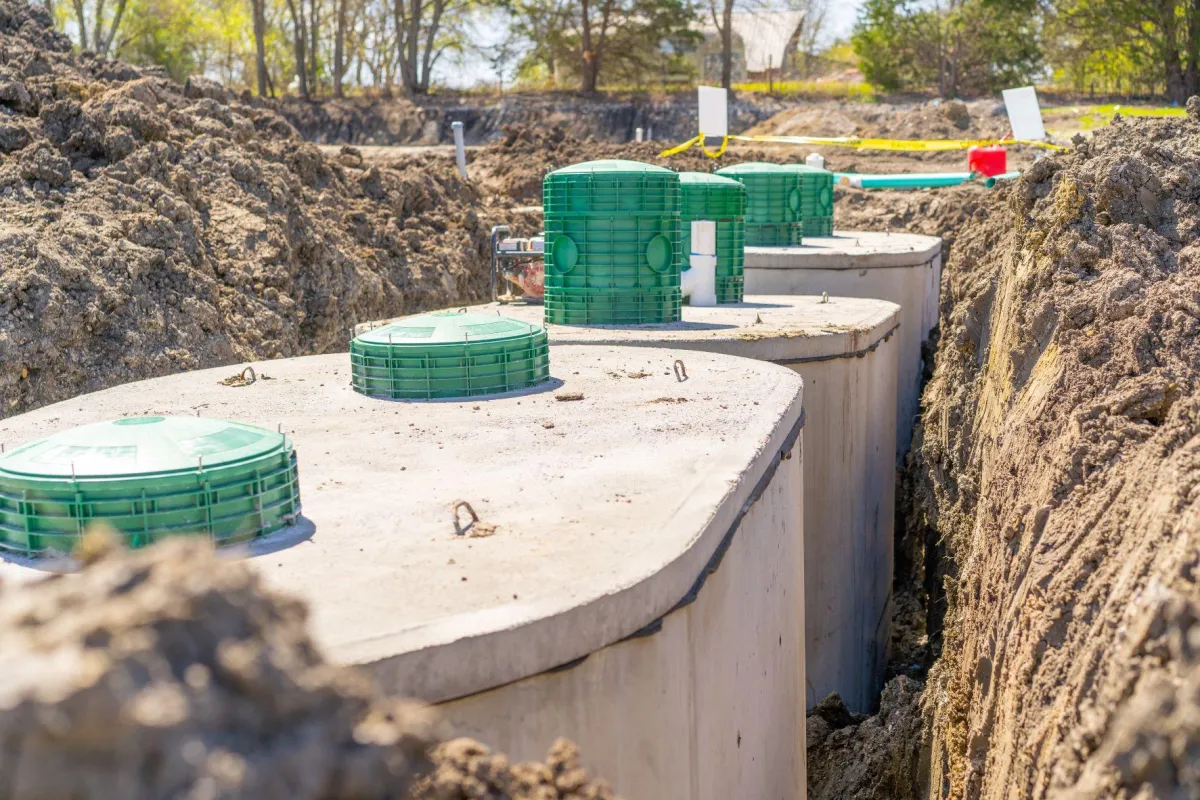
Serving Texas Counties: Collin, Grayson, Dallas, Denton, Rockwall, Fannin and Hunt
Septic Installation near Flower Mound in Denton County, TX
Total Septic is Committed to superior quality and results!

AVOID COSTLY MISTAKES:
Do NOT hire an excavating contractor without first reading our free guide:
The ULTIMATE Excavation & Septic "Success Guide."

Septic Installation near Flower Mound in Denton County
A dependable septic system starts with a site-specific plan. In Denton County, soils can change from tight blackland clays to quicker-draining loams within a few streets. Intense rainstorms raise groundwater and expose weak designs. Local rules define setbacks, tank sizes, electrical standards, and inspection checkpoints. If you are planning a septic installation near Flower Mound in Denton County, TX, begin with accurate soil information, choose the right technology, and build with proven methods. Done right, your system quietly protects your home, your landscaping, and the water beneath your feet for years.
How Can We Help?


What a modern septic installation near Flower Mound does
A residential septic system receives wastewater from sinks, showers, toilets, and appliances. Solids settle in a tank where natural biology begins the breakdown. Clarified effluent then moves to the dispersal area, and unsaturated soil completes treatment through filtration and microbial action. Around Flower Mound, common configurations include conventional gravity drain fields for lots with strong percolation, low-pressure dosing for even distribution across flat trenches, aerobic treatment units that improve effluent quality, and drip dispersal that fits tight lots or sensitive landscaping.
A quality installation begins with a site evaluation and soil profile, followed by a design that right-sizes the tank, matches treatment to your soil, and locates components to meet setbacks from wells, creeks, property lines, and structures.
Benefits of septic installation near Flower Mound in Denton County, Texas
Independence is a major benefit because many properties are not connected to municipal sewer and extension fees can be high. Reliability comes next. A well-designed system manages weekend guests and peak laundry days without backups or odor. Environmental protection matters too. Correctly sized tanks, pretreatment, and drain fields prevent surfacing effluent and protect nearby water. Resale confidence is real. A documented, code-compliant system in TX Denton County reassures buyers and lenders during inspections and appraisals. Long-term savings also add up. Efficient layouts reduce pump run times, smart access risers simplify maintenance, and thoughtful grading prevents erosion that can shorten a system’s life.
Why hire a septic installation near Flower Mound in Denton County
Local experience prevents costly mistakes. Blackland clay expands when wet and slows infiltration. Sandy seams move water quickly and require protective dosing. A seasoned installer reads these patterns, chooses the right technology for your lot, and positions components to perform consistently through wet and dry seasons. Knowledge of permits also matters. Professionals understand county submittals, state standards, and the field details inspectors check, such as elevations, model numbers, trench depths, and electrical safety. Build quality is the final difference. An organized crew sequences excavation, tank setting, manifold leveling, pipe bedding, and compaction so your yard recovers faster and the system functions as designed.
See Our Excavation & Septic Services

✔️ Commercial Excavation
✔️ Residential Excavation
✔️ Demolition
✔️ Dozer work
✔️ Septic inspections
✔️ Septic system pumping
✔️ Septic installs traditional systems
✔️ Septic tanks - aerobic systems
✔️ Septic tanks - Plastic/poly
Quality Services Launched FAST!

✔️ Septic tanks - Concrete
✔️ Sewer repairs
✔️ Trenching
✔️ Utilities Trenching
✔️ Pump Outs Installs
✔️ Maintenance Contracts
What Are You Waiting For?
The step-by-step process for hiring in Denton County
Start with a discovery call to discuss bedrooms, fixtures, household size, and water-use habits. Gather your lot survey and note easements, wells, trees, slopes, and equipment access routes. Schedule a site evaluation. The evaluator digs test pits or auger borings to confirm texture, structure, restrictive layers, and seasonal water-table indicators. With that data, you receive a preliminary design that outlines the system type, tank size, dispersal area, estimated budget, and a realistic timeline. If the plan fits, a detailed proposal and signed authorization allow the designer to finalize calculations, produce drawings, and submit the permit package. You will see setbacks, elevations, electrical notes, and pump specifications where required.
Once permits are approved, construction begins. The crew coordinates utility locates, material deliveries, and excavation. The tank is set on stable bedding, distribution boxes or manifolds are leveled, and perforated laterals or drip tubing are installed at engineered depth and spacing. Where pumps or aeration are required, licensed electrical work provides dedicated circuits, weather-rated panels, floats or timers, and audible or visual alarms. Before backfilling, the inspector verifies components, elevations, and setbacks. After approval, the team restores grades, compacts as specified, and seeds or lays sod so your yard returns to normal quickly.
What affects the cost near Flower Mound
Costs reflect soil conditions, system type, space constraints, depth to rock, and site access. Conventional gravity systems typically cost less but require suitable percolation and adequate area. Aerobic treatment with spray or drip dispersal costs more up front, yet it unlocks challenging lots and protects sensitive soils. Extras such as pump chambers, control panels, filtration, risers, and sampling ports add materials and labor. Rocky soils, tight backyards, long pipe runs, and tree-protection zones may extend excavation hours. Clear estimates separate design, permitting, materials, equipment, electrical, and restoration so you can compare proposals line by line and understand where money is spent.
How to prepare your property
Create clear access by moving vehicles, trailers, and equipment away from the work path. Mark irrigation lines, invisible dog fences, and any private utilities not covered by locates. Choose a staging area for materials and spoils, and designate where clean topsoil should be reserved for final grading. If you plan patios, sheds, or future additions, share those plans early so the drain field sits out of conflict. Protect trees by fencing root zones beyond the drip line. During wet weather, minimize traffic on the yard to limit ruts and compaction. A little preparation keeps the project efficient, tidy, and predictable.
Care tips after your septic installation near Flower Mound in Denton County
Simple habits protect performance. Spread laundry loads across the week, repair running toilets quickly, and choose septic-safe paper. Do not flush wipes, hygiene products, or grease. Keep vehicles and heavy planters off the drain field, plant grass rather than shrubs above it, and route roof runoff away. Schedule routine inspections based on your system type. Aerobic units need more frequent service, while conventional systems benefit from periodic pump-outs determined by household use. Keep a digital folder with permits, drawings, service logs, and alarm instructions. Good records support warranties, speed troubleshooting, and help future buyers understand your system.
Choosing the right partner
Look for straight talk, written scopes, and proof of licensing for septic work in TX Denton County. Ask for recent local references and photos of completed systems similar to your site. Review how each design addresses your soil, setbacks, elevations, and lifestyle. Compare value rather than chasing the absolute lowest price. The best choice balances capacity, reliability, service access, and restoration quality. When you select a partner who listens, explains tradeoffs, documents their work, and stands behind it, your septic installation near Flower Mound becomes a quiet asset that protects your property and your peace of mind.
Facebook
Google Plus